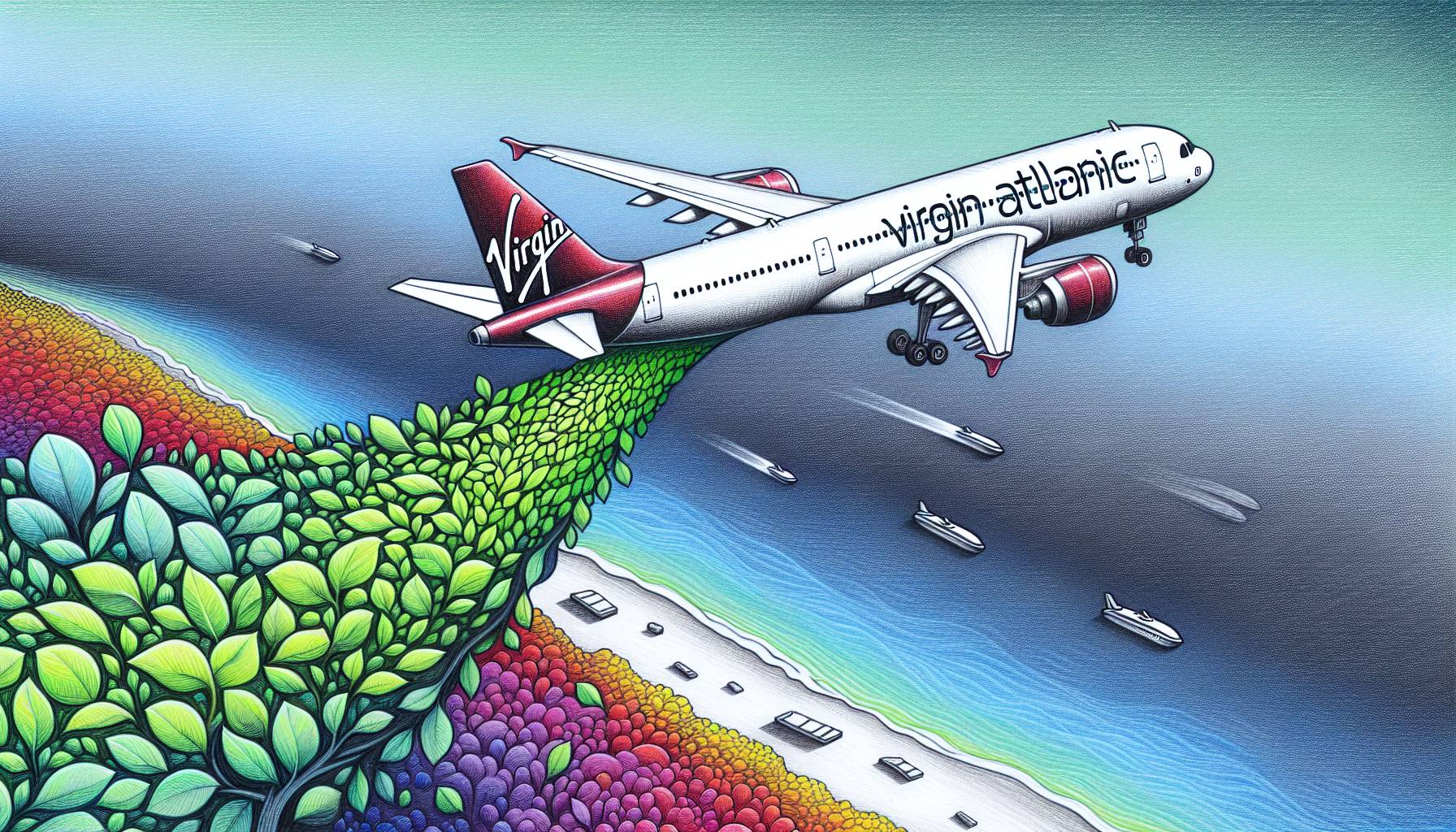Historic milestone in sustainable aviation
A momentous occasion transpired when a Virgin Atlantic Boeing 787 made its first solely sustainable aviation fuel (SAF)-powered transatlantic trip, arriving at John F. Kennedy International Airport. The trial flight from London to New York used SAF produced from waste fats and plant sugars, successfully lowering carbon emissions by 70% compared to fossil-based jet fuel. This groundbreaking achievement marks a significant step towards a more sustainable future for the aviation industry, as it demonstrates the viability of SAF in long-haul flights. In addition to reducing greenhouse gas emissions, the utilization of waste fats and plant sugars in fuel production promotes circular economy principles and bolsters waste management efforts.
Prospects for SAF in the aviation industry
Even though SAF production is currently minimal, comprising only 0.1% of airline fuel usage, experts anticipate its significant contribution to mitigating aviation’s environmental impact. Andrew Chen, the aviation decarbonization principal at the Rocky Mountain Institute, stressed the crucial role of SAF in the industry’s shift towards zero carbon emissions. As airlines continue to prioritize sustainability, the demand for SAF is expected to experience substantial growth in the coming years. With continuous advancements in technology and partnerships among various stakeholders, SAF will play a key role in enabling the aviation industry to meet its climate targets and reduce its carbon footprint.
Virgin Atlantic’s trial and the future of SAF
Although Virgin Atlantic’s 100% SAF flight was a singular occurrence and standard jet engines aren’t built for exclusive use of eco-friendly fuels, Chen considers it a critical landmark showcasing SAF’s potential in the decarbonization journey. The successful flight demonstrates the viability of SAF as a key component in transitioning the aviation industry towards more sustainable practices. As research and development of SAF continues to advance, it is expected that further improvements in efficiency and adaptation of existing engines will bring us closer to a greener future in air travel.
Exploring diverse sources and novel technologies
SAFs can be derived from diverse raw materials, including corn, animal fat, algae, and municipal waste. Nevertheless, to attain zero carbon emissions, the aviation sector must investigate novel technologies like electric batteries and liquid hydrogen fuel options. Incorporating these cutting-edge technologies into aircraft design and operations will be crucial for the aviation industry’s long-term sustainability. Furthermore, collaboration between airline companies, governments, and research institutions is vital to foster innovation and encourage large-scale adoption of cleaner energy sources.
Utilizing SAF as a drop-in fuel
As they await such developments, existing aircraft will persist in depending on liquid fuel. The “drop-in” characteristic of SAF makes them valuable during this transition, as they can be blended with conventional jet fuel to minimize emissions. This blend allows airlines to continue operating with their current fleet while progressively reducing their carbon footprint. Additionally, the ongoing research and development of SAF production methods will eventually lead to higher blending rates, further lessening the environmental impact of air travel.
Overcoming challenges in SAF market
However, challenges in the SAF market, such as elevated costs and sluggish growth, need to be tackled. To overcome these obstacles, collaborative efforts between industry stakeholders, governments, and research institutions must be prioritized to streamline production processes and foster innovative solutions. These partnerships have the potential to not only reduce costs, but also accelerate the mainstream adoption of sustainable aviation fuels, paving the way for a greener future in air travel.
Investing in new production facilities
To do this, airlines and fuel refiners must pour resources into new production facilities to decrease manufacturing expenses and boost demand for sustainable alternatives. Through collaborations and investments, these industries can foster the development of innovative technologies and methods to efficiently produce eco-friendly aviation fuels. By shifting focus towards sustainability, airlines and fuel refiners can significantly reduce the carbon footprint of air travel while meeting the growing demands of a more environmentally-conscious society.
First Reported on: washingtonpost.com
FAQs
What is sustainable aviation fuel (SAF)?
Sustainable aviation fuel (SAF) is a type of fuel produced from renewable and sustainable sources such as waste fats, plant sugars, corn, animal fat, algae, and municipal waste. SAF has the potential to significantly lower carbon emissions compared to fossil-based jet fuel, making it a key component in transitioning the aviation industry towards more sustainable practices.
What was the significance of the Virgin Atlantic Boeing 787 flight using 100% SAF?
The Virgin Atlantic trial flight demonstrated the viability of SAF in long-haul flights by successfully reducing carbon emissions by 70% compared to fossil-based jet fuel. It marks a significant step towards a more sustainable future for the aviation industry and showcases the potential of SAF in the decarbonization journey.
How can SAF contribute to reducing the environmental impact of aviation?
SAF can help reduce the environmental impact of aviation by minimizing greenhouse gas emissions, promoting circular economy principles, and bolstering waste management efforts. As research and development of SAF continues to advance, improvements in efficiency will further lessen the environmental impact of air travel.
What are the challenges in the SAF market?
Challenges in the SAF market include elevated costs, sluggish growth, and limited production capacity. To overcome these obstacles, collaborative efforts between industry stakeholders, governments, and research institutions must be prioritized to streamline production processes, foster innovative solutions, and accelerate the mainstream adoption of sustainable aviation fuels.
How can the aviation industry invest in the production of SAF?
Airlines and fuel refiners can invest in new production facilities to decrease manufacturing expenses and boost demand for sustainable alternatives. Through collaborations and investments, these industries can foster the development of innovative technologies and methods to efficiently produce eco-friendly aviation fuels, ultimately reducing the carbon footprint of air travel while meeting the growing demands of a more environmentally-conscious society.













